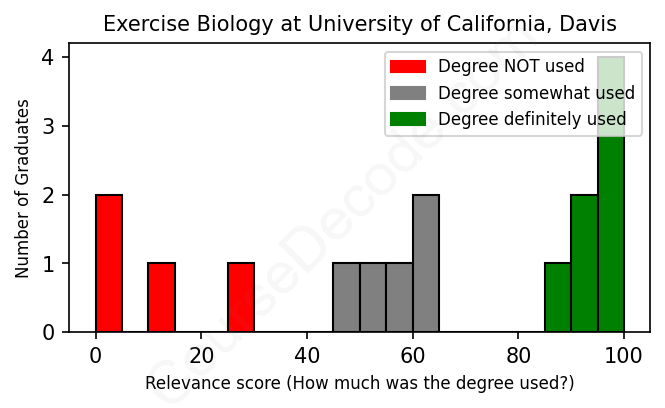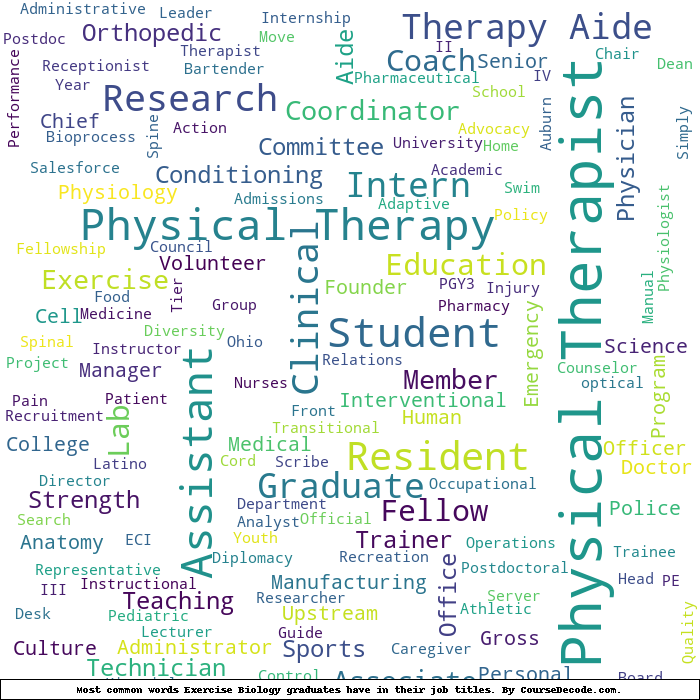
First, some facts. Of the Exercise Biology graduates from University of California, Davis we've analyzed , here's how many have used (or NOT used) their degree in their career:

These are estimates based on AI analysis of 16 LinkedIn profiles (see below).
The verdict? Below average. Overall, with an average relevance score of 61%, Exercise Biology graduates from University of California, Davis have a lower likelihood (-6%) of finding work in this field compared to the average graduate across all fields:
And for comparison, here's the chart for all profiles we've looked at across all degrees.
Also, after graduating, 81% of these graduates have pursued further education other than another Bachelor's degree (such as a Masters degree or other), compared to the average across all profiles of 35%. This suggests you may need more than just a Bachelors degree to be competitive as a Exercise Biology graduate.
See the details:
|
Relevance score: 55% We think this person has gone into a career only somewhat relevant to their degree. We think this person has gone into a career only somewhat relevant to their degree.
DEGREE INFOGraduated in 2012 from University of California, Davis with a Bachelor of Science (B.S.) in Exercise Biology. Also pursued further education since (see below). JOB HISTORY SINCE GRADUATIONOffice Administrator Orthopedic Physical Therapy Institute, Inc. Jun 2014 - Apr 2016 Operations Manager  ARTHUR J. TING, M.D., INC. May 2017 - Sep 2018 Project Program Coordinator  Stanford Health Care Oct 2018 - Jun 2019 Patient Relations Manager  Stanford Health Care Nov 2019 - Sep 2021 FURTHER DEGREES DONE SINCE GRADUATINGMaster of Science (MS)California State University-East Bay 2016 - 2017 ABOUTNo information provided. |
The top 10 most common jobs done by the graduates we've analyzed (ranked most common to least) are:
From analyzing the job profiles of graduates with a degree in Exercise Biology from the University of California, Davis, it becomes clear that many individuals end up in fields directly related to physical therapy and rehabilitation. A significant number of alumni pursue roles as Physical Therapists or Physical Therapy Aides, emphasizing their expertise in applying exercise science principles to assist in patient recovery and fitness regimens. Other related positions include Clinical Exercise Physiologists and roles in sports medicine, where graduates leverage their knowledge to better understand human movement and exercise's impact on health.
However, there’s a noticeable trend where many graduates take up positions that aren't closely tied to exercise biology, such as administrative roles or in completely different fields like pharmaceuticals or law enforcement. While some jobs may benefit from a general understanding of health and biological concepts, they do not require specific exercise biology knowledge. Overall, while many graduates find themselves in relevant roles, a considerable percentage drift into paths where their exercise biology background is less applicable, illustrating a mix of direct and tangential career outcomes for these alumni.
Here is a visual representation of the most common words in job titles for Exercise Biology graduates (this is across all Exercise Biology graduates we've analyzed, not just those who went to University of California, Davis):

So, if you’ve got a degree in Exercise Biology from UC Davis, it looks like many of your peers have gone on to pursue careers primarily in healthcare and fitness. Right after graduating, a good number of them started off in entry-level positions like physical therapy aides or internships in medical settings. These roles typically gave them hands-on experience, which is super valuable, especially if they aimed to become physical therapists or work in sports medicine. It’s clear that many of these graduates are well-aligned with their field— a lot of them transitioned from those initial company roles into more advanced positions, such as physical therapists, exercise physiologists, or even specialized roles like emergency medicine residents or pain physicians.
Fast forward five or ten years later, and you’ll find that a solid chunk of these graduates really climbed the ladder in their chosen paths. Many secure roles that are directly related to exercise or physical health, like becoming licensed physical therapists, exercise physiologists, or dental assistants. Some even move into leadership positions or specialized areas, like rehabilitation or sports performance. While there are a few individuals who veer off into unrelated fields or roles that aren’t as connected to exercise biology, the overall trend points toward successful career trajectories primarily relevant to the field. It seems like UC Davis degrees in Exercise Biology have a pretty solid bang for their buck, especially if you love fitness, healthcare, or working with people to improve their physical health.
Honestly, a Bachelor’s degree in Exercise Biology at UC Davis can be pretty challenging, but it really depends on your background and interests. If you're into science and enjoy subjects like biology, anatomy, and physiology, you might find it engaging, but the coursework can be intense, especially with lab work and the depth of material you’ll need to master. It’s not the easiest major out there, as you’ll be expected to keep up with tough classes and possibly some research projects, but if you're passionate about the field, you'll likely find it rewarding. Just be ready to put in the effort!
Most commonly, in the LinkedIn profiles we've looked at, it takes people 4 years to finish a Bachelor degree in Exercise Biology.
Looking at the jobs that these Exercise Biology grads from UC Davis have landed, it seems like they're generally doing okay financially, especially those who’ve gone down the medical and specialized therapy paths. The ones who became physicians and physical therapists are likely making decent salaries, considering those roles typically command good pay. For instance, the grad who’s now an Interventional Pain Physician is probably raking it in, and even the physical therapy folks who have built up their experience can earn a solid wage. On the other hand, some of the roles, like administrative or assistant positions, tend to pay less, so those grads might not be making as much. Overall, while there’s a mix, it looks like many are set up for comfortable earnings as they gain experience in their fields.
Here is a visual representation of the most common words seen in the "about" section of LinkedIn profiles who have a Bachelor degree in Exercise Biology (this is across all Exercise Biology graduates we've analyzed, not just those who went to University of California, Davis). This may or may not be useful:

Here are all colleges offering a Bachelor degree in Exercise Biology (ordered by the average relevance score of their Exercise Biology graduates, best to worst) where we have analyzed at least 10 of their graduates:
| College | Score | Count |
|---|---|---|
 University of California, Davis University of California, Davis
|
61 | 16 |